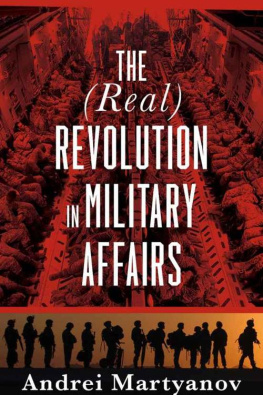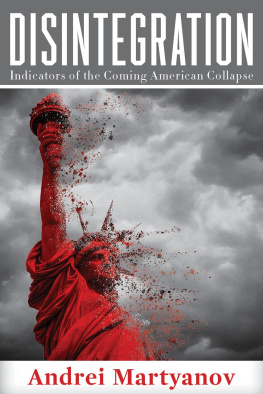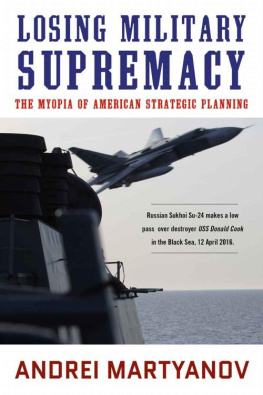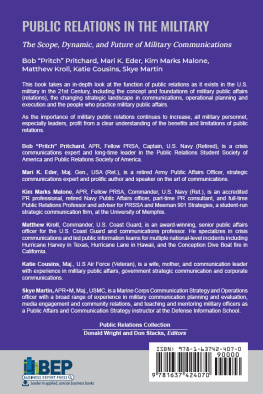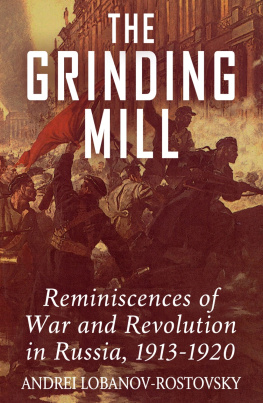Andrei Martyanov - The (Real) Revolution in Military Affairs
Here you can read online Andrei Martyanov - The (Real) Revolution in Military Affairs full text of the book (entire story) in english for free. Download pdf and epub, get meaning, cover and reviews about this ebook. year: 2019, publisher: Clarity Press, genre: Politics. Description of the work, (preface) as well as reviews are available. Best literature library LitArk.com created for fans of good reading and offers a wide selection of genres:
Romance novel
Science fiction
Adventure
Detective
Science
History
Home and family
Prose
Art
Politics
Computer
Non-fiction
Religion
Business
Children
Humor
Choose a favorite category and find really read worthwhile books. Enjoy immersion in the world of imagination, feel the emotions of the characters or learn something new for yourself, make an fascinating discovery.
- Book:The (Real) Revolution in Military Affairs
- Author:
- Publisher:Clarity Press
- Genre:
- Year:2019
- Rating:4 / 5
- Favourites:Add to favourites
- Your mark:
- 80
- 1
- 2
- 3
- 4
- 5
The (Real) Revolution in Military Affairs: summary, description and annotation
We offer to read an annotation, description, summary or preface (depends on what the author of the book "The (Real) Revolution in Military Affairs" wrote himself). If you haven't found the necessary information about the book — write in the comments, we will try to find it.
The (Real) Revolution in Military Affairs — read online for free the complete book (whole text) full work
Below is the text of the book, divided by pages. System saving the place of the last page read, allows you to conveniently read the book "The (Real) Revolution in Military Affairs" online for free, without having to search again every time where you left off. Put a bookmark, and you can go to the page where you finished reading at any time.
Font size:
Interval:
Bookmark:

The (Real)
Revolution in
Military Affairs

A NDREI M ARTYANOV

Clarity Press, Inc.
2019 ANDREI MARTYANOV
ISBN: 978-1-949762-07-5
EBOOK: 978-1-949762-08-2
In-house editor: Diana G. Collier
Cover: R. Jordan P. Santos
ALL RIGHTS RESERVED: Except for purposes of review, this book may not be copied, or stored in any information retrieval system, in whole or in part, without permission in writing from the publishers.
Library of Congress Control Number:2019942048
Clarity Press, Inc.
2625 Piedmont Rd. NE, Suite 56
Atlanta, GA. 30324
http://www.claritypress.com


Just recently a respectable, conservative, and to their greatest credit, anti-war publication, The American Conservative , unleashed a scathing, well-justified, criticism on warmongers and Iran hawks such as David Brooks and Bret Stephens, who write primarily for the New York Times . Both Brooks and Stephens, among very many similar others, fancy themselves pundits, analysts, columnists and commentators with a focus on geopolitics and international relations. No doubt, they analyze and comment on those issues and, as is the case with any humanities-educated pundits among leading American mainstream media personalities, they boast an impressive (for media figures) set of credentials in all kinds of disciplines related to mediafrom history, to political philosophy to journalism. What neither Brooks nor Stephens, as well as the vast majority of American political class, have as credentials is even an infinitesimally small background in the subjects on which all of them are trying to comment, analyze and (for those in position of political power) even make decisionswarfare.
Warfare is a geopolitical tool of the first order. In fact, geopolitics as a field of interaction of nations cannot exist without it. Warfare, in the end, formed and continues to be anchored in the human condition, and as a result, in our political, social, economic and cultural institutions. No understanding of warfare is possible without understanding its most important tools, weapons and people, tactics and operational art. It is precisely the field in which American political class has zero competenciesthey simply do not teach nor grant degrees in what amounts to military science in the United States. Obviously, rubbing shoulders with American military top brass and listening to rumors may create among some pundits and political figures an illusion that they know how the military operates or how wars are foughtbut it is only an illusion. Truth to be told, regurgitation of the few, beaten to death, political talking points in the media sphere doesnt require any serious background in anything of substance. On the other handwriting a graduate thesis on Anti-Submarine Warfare operations in Arctic or on Fractionate Exchange Rates during air operations in the EW-dense environmentare the skills of a completely different level and backgrounds of which modern American pundits and an army of armchair military analysts cannot conceive. But precisely these skills and knowledge are the key to not only understanding of a modern warfare but to grasping geopolitical reality which is increasingly complex and rests on the foundation of the ever-evolving and revolutionary military technologies.
To forestall possible accusations of disparagement of the field of humanities leveled against me, it should be noted that my point is completely different here: modern war between nation-states became so complex, in reflection of the tools of such wars, that it is an axiom, not even a theorem, that people who cannot grasp fundamental mathematical, physical, tactical and operational principles on which modern weapon systems operate are simply not qualified in the minimal degree to offer their opinions on the issues of warfare, intelligence operations and military technology without appropriate backgrounds. Failing that, what can one think but that they are merely in the business of content provision (filling space/entertainment) or of propagating the official lineof propaganda, in shortmostly with regard to warmongering? In todays information-oversaturated world of massive egos nurtured by the dopamine of public visibility and of American politics turned into showbiz, these are the types who dominate the discussion on the most important, vital issue of war and peace in our time. And, truth to be told, the Theory of Operations or Operational Planning are on an order of magnitude harder to learn than, say, Comparative Politics in the course of Political Science, even though this Politics of necessity is still revolving around economic and military power.
I am completely aware how difficult it is today for any person, bombarded by salvo upon salvo of irrelevant, misleading, useless information, to try to get a handle on the historic change unfolding before their very eyes. It is impossible to get a handle on this without understanding how politics is defined by elements of power, among which real economic and military factors are the main drivers of this change. In this book I am trying to give at least some, by far not all, of the ABCs in military affairs and explain how a revolution in military affairs, a real one, many times declared prematurely, now shapes our modern world and how modern weaponry completely and dramatically, indeed in a revolutionary way, has changed the global balance of power, despite many models predicting very different and much less dramatic scenarios.
I tried my best, at the insistence of my wonderful publisher, to stay away from math or to simplify it. You, the reader, will be the one who will pass judgement on my success, or otherwise, in trying to avoid getting into the calculus or probabilities. While some high school basic math, including some basic factoring, will still be needed for its greatest appreciation, this book was written in a such a way that those who do not want to deal with any math at all can simply skip any parts with mathematics in them; this will not distort the main message of the book.
I can only hope that the knowledge readers will gain through this book will help to increase public awareness of the deadly consequences of even a conventional war between global superpowers and will help to dispel the war propaganda being pushed on the public by ignorant and incompetent pundits who have no business offering even an iota of their opinions on what is today a Revolution in Military Affairs of historic magnitude.

In The Great Delusion, his latest work on the fallacy of a liberal view of the world which has been enthusiastically embraced in the United States, John Mearsheimer elaborates extensively on his opinion of the objective of the political ideologies and views of our timea good life. Following a liberal, by definition relativist, view of the world, Mearsheimer concludes, leads to truth becoming very elusiveand accordingly, so does a universal definition of a good life. The title of his latest treatise is a good indicator that Mearsheimer, one of the few leading mainstream American political scientists, along with thinkers of scale, such as Paul Craig Roberts, recognizes the economic and intellectual crisis of liberalism as well as liberalisms utter failure to provide any coherent answer as to what a good life, indeed, is. But Mearsheimer doesnt go far enough. Unlike Paul Craig Roberts, Mearsheimer limits his critique of liberalism to what he defines broadly as nationalism, failing to address the main economic drivers impelling liberal aggression, and continuing to take the United States at face value as a liberal democracy. The United States is no longer a liberal democracy, if ever it was one.
Font size:
Interval:
Bookmark:
Similar books «The (Real) Revolution in Military Affairs»
Look at similar books to The (Real) Revolution in Military Affairs. We have selected literature similar in name and meaning in the hope of providing readers with more options to find new, interesting, not yet read works.
Discussion, reviews of the book The (Real) Revolution in Military Affairs and just readers' own opinions. Leave your comments, write what you think about the work, its meaning or the main characters. Specify what exactly you liked and what you didn't like, and why you think so.

